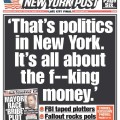Post by Columnist Richard Brodsky, used with permission.
“It is but equity that they who feed, clothe, and lodge the whole body of the people, should have such a share of the produce of their own labour as to be themselves tolerably well fed, clothed and lodged.” — Adam Smith, Wealth of Nations

A “minimum wage” is a government-established standard for what a private-sector employer must pay to a private-sector employee. It’s been law since the New Deal, varying from state to state. It affects all employers, as defined in law, and is seen as a basic worker protection. The right says it depresses employment; the left says it assures decent compensation and has no long-term effect on jobs.
A “living wage” is something different, although there’s a lot of sloppy verbiage about it and the two are often used interchangeably. A “living wage” is considerably higher than a minimum wage and is required only of those employers who receive significant public benefits. In other words, if you get taxpayer money to build your project, then people who are employed there are to be paid a higher wage than the marketplace would offer. If you get a public subsidy, you pay your employees enough to live on. If you don’t want to pay a living wage, don’t take the subsidy.
There’s a lot more to living wage proposals than emotional appeals to help working families and reaction to corporate welfare. Increasing wages will increase spendable income, which will increase demand, which will increase economic activity that benefits everyone. It’s anti-austerity economics turned into a workable program.
Whatever opposition exists to government wage setting, there’s little intellectual basis for opposing government setting economic conditions when it gives public money to a private person. Developers and other corporate beneficiaries of taxpayer largesse don’t have much of a place to stand when they oppose living wages. Even otherwise sensible developers like New York’s Doug Durst fall back on untrue-isms used against the minimum wage: “If you mandate that people get higher benefits at projects that the city puts money into, you’re not going to get tenants.” That’s just holdover nonsense from the Bloomberg era.
The rise in national concern about income inequality has been a little slow to develop workable remedies. They will come as more thinking is devoted to it and as Americans demand government action to undo the policies that have concentrated wealth and made it hard to live for average working families. Living wage proposals seem to be the fastest and easiest to explain of the current remedies.
The left’s newest icon, Mayor Bill de Blasio, has just jumped to the front of the line of living wage proponents, deciding to greatly expand the number of workers covered and the amount they will receive. It’s a solid proposal, but needs better explaining. The public has generally accepted the idea of minimum wage increases. But support for living wage increases, because they’re tied to public subsidies for corporations, will be bigger, faster and more sustained. It should be Number One in de Blasio’s ambition to create a progressive model for workable, efficient government.
Shifts in public opinion are faster than the development of concrete remedies. So it is with living wage proposals. But the combination of Bill de Blasio and Adam Smith should be enough to kick-start a national upsurge of living wage laws. It’s good economics and it’s good policy.
















Follow Us